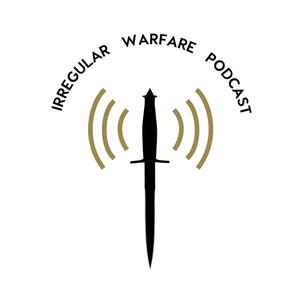
Modern War Institute
John Amble
The Modern War Institute podcast is the flagship podcast of the Modern War Institute at West Point. Featured guests include senior military and defense leaders, scholars, and others who discuss the most important issues related to modern conflict.
- 41 minutes 31 secondsHow Iran's Missile and Drone Attack Was Defeated
When Iran recently launched more than three hundred drones, ballistic missiles, and cruise missiles in a large-scale attack against Israel, almost every single one was stopped from reaching its target. A combination of ground-based air defenses, ship-launched weapons, and aircraft from multiple nations were involved in the defensive operation. But how does such a complex air defense mission happen? How is it commanded and controlled? How are the differing capabilities of such a variety of air defense systems integrated most effectively? And what lessons can be derived from the Iranian attack and the successful defense to inform the way the United States and its partners and allies conceptualize and implement defenses against a rapidly evolving air and missile threat?
17 April 2024, 9:54 pm - 48 minutes 7 secondsNATO at 75
Seventy-five years ago, on April 4, 1949, representatives of twelve governments came together to sign the North Atlantic Treaty. Much has changed in the intervening period—the Cold War came and went, NATO invoked the Article 5 collective defense clause after the 9/11 attacks, an era of renewed strategic competition has emerged, and large-scale conflict has returned to the continent of Europe. Yet despite all of that change, in both the strategic landscape and the alliance itself, NATO's history is marked by remarkable continuities. That means that an appreciation of its history provides a useful framework within which to understand the challenges and opportunities NATO faces today. To explore that history, this episode features a discussion with Seth Johnston, a US Army officer and author of How NATO Adapts: Strategy and Organization in the Atlantic Alliance since 1950.
4 April 2024, 4:13 pm - 57 minutes 23 secondsResistance and the National Defense of Small States
In this episode, John Amble speaks to Sandor Fabian about a very specific approach to national defense: resistance. The war in Ukraine has made clear that comparatively small states can be vulnerable to the threat of aggression from larger neighbors. Resistance, Sandor argues, is the most viable means of defense for these states. But effectively embracing it as a strategic approach would require dramatic changes in force structure, training, equipment, doctrine, and more. And if small US allies choose to do so, it would have important implications for US special operations forces and for NATO.
21 March 2024, 10:20 am - 42 minutes 29 secondsNuclear Weapons—Past, Present, and Future
For eight decades, the world has navigated the risk of nuclear war. But what will be required to so in the future? And because that risk is not static, how do we measure, conceptualize, and respond to changes—like when Russia rattles its nuclear saber? What challenges do so-called tactical nuclear weapons pose to deterrence models based on much larger, strategic weapons? And what dynamics influence both the creation and erosion of international arms control frameworks that aim to regulate these weapons? This episode tackles those questions and more. It features a discussion with W. J. “Bill” Hennigan, the lead writer for a new series published by the New York Times called “At the Brink.”
7 March 2024, 10:49 am - 44 minutes 55 secondsFrom Hezbollah to the Houthis—Understanding Iran's Proxy Network
The Houthi movement in Yemen has launched dozens of attacks against commercial ships in the Red Sea in recent months. Over the same period, militant groups have attacked US forces in the Middle East as many as 160 times—including the deadly drone attack against a base on Jordan’s border with Syria. And cross-border strikes between Hezbollah, operating from its southern Lebanon base, and Israeli forces have increased. All of this has occurred since Israel began its campaign in Gaza in response to Hamas’s October 7 attacks. And all of these groups have strong relationships with Iran. But how should we understand this complex array of combatant groups and their employment by Tehran? More directly, how should the US government respond to these groups’ actions? To explore these questions, this episode features a conversation with Jonathan Panikoff, director of the Scowcroft Middle East Security Initiative at the Atlantic Council.
6 February 2024, 10:14 am - 1 hour 4 minutesSanctions and Security
While Ukraine's international supporters have provided equipment to enable the country's defense against Russia's aggression for nearly two years, global actors have also responded on a completely separate front—putting in place a massive sanctions regime targeting Russia. What effect have they had on Russia and its ability to make war? More broadly, how do sanctions and other instruments of economic statecraft fit within the United States' foreign and security policy? To explore those questions, John Amble is joined on this episode by Edward Fishman, a former government official who worked extensively on sanctions policy and is now an adjunct senior fellow at the Center for a New American Security and a nonresident senior fellow at the Atlantic Council.
26 January 2024, 6:41 am - 33 minutes 58 secondsAmphibious Operations—from History to the Future Battlefield
Most people know something about the most famous amphibious operations in military history—the D-Day landings and Gallipoli, for example. But what about an amphibious night attack on the shores of Tuscany in 1555? Or a Turkish amphibious assault in response to a coup in Cyprus in 1974? This episode features a conversation with Tim Heck, coeditor of the book On Contested Shores: The Evolving Role of Amphibious Operations in the History of Warfare, and explores the past, present, and future of amphibious operations.
27 December 2023, 3:48 pm - 32 minutes 58 secondsUnderstanding Hamas: From Tactics to Strategy
This special episode of the MWI Podcast features the first installment of a three-part miniseries produced by the Irregular Warfare Initiative. The series focuses on irregular warfare in Israel and is hosted by Adam Darnley-Stuart. In the first episode, he speaks to renowned counterterrorism analyst Dr. Levi West about Hamas, its history, and its strategy. Dr. West offers nuanced insights into Hamas operations and the likelihood that the organization's tactics might be adopted by other groups around the world. The discussion explores the effects of the October 7 Hamas attacks and Israel's ongoing military response on the enduring friction between Israel and Iran, examines the broader impacts on the geopolitical environment, and more. Be sure to subscribe to the Irregular Warfare Podcast to hear the second and third parts of this timely series.
14 November 2023, 12:18 pm - 44 minutes 15 secondsShusha, the Battle that Won a War
Observers watched the 2020 Nagorno-Karabakh War closely, searching for indicators of the character of warfare on tomorrow's battlefields. The lessons extracted have covered advanced technology and unmanned platforms, proxy dynamics, the ongoing relevance of armor, and more. But some of the most important lessons have received much less attention. They center around the increasingly unavoidable importance of combat in cities and are drawn principally from the battle for the city of Shusha—a fight that arguably decided the outcome of the war. Listen as John Spencer, chair of urban warfare studies at MWI, explains why.
1 November 2023, 8:57 am - 38 minutes 50 secondsWhat Was Hamas Thinking?
When Hamas fighters conducted a large-scale and deadly attack against Israel and its people on October 7, what was the group aiming to achieve? What were its strategic objectives? And what sort of Israeli response was it planning for? On this episode, John Amble speaks to Dr. Michele Groppi, a lecturer in the Defence Studies Department at King’s College London. Hamas's brutal attacks might have been tactically successful, but as Michele argues, they also might have actually exceeded what the group thought it would be able to accomplish. And that tactical success might prove to be a major strategic error, if Israel sets as the objective of any ground campaign in Gaza the complete organizational dismantling of Hamas and total destruction of its military capabilities.
23 October 2023, 3:26 pm - 39 minutes 16 secondsCombined Arms in Gaza
As Israeli ground forces mobilize for what at this point appears to be a looming battle in Gaza to destroy Hamas military capability, this episode looks ahead at what form that battle will take. Liam Collins and John Spencer, two former Army officers with a a variety of combat experience and the authors of a book on urban warfare, join John Amble to explore the importance of employing combined arms—infantry, tanks, artillery, engineers, and other capabilities—when operating in urban areas like those that compose much of Gaza's territory. They describe why such an approach will be central to determining the shape of the battle and its outcome, as well as the challenges of operating in this fashion in complex and structurally dense cities.
18 October 2023, 3:30 pm - More Episodes? Get the App
Your feedback is valuable to us. Should you encounter any bugs, glitches, lack of functionality or other problems, please email us on [email protected] or join Moon.FM Telegram Group where you can talk directly to the dev team who are happy to answer any queries.
 The Spear
The Spear
 Horns of a Dilemma
Horns of a Dilemma
 Net Assessment
Net Assessment
 Urban Warfare Project
Urban Warfare Project
 Irregular Warfare Podcast
Irregular Warfare Podcast
 War on the Rocks
War on the Rocks